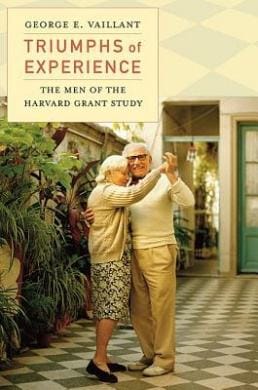The Grant Study
The Grant Study was originally funded to test criteria for choosing the best leaders in business and the military. It began in 1938 and over three years they carefully chose 268 men, all from Harvard, although for many years that was never admitted. The study was expected to last up to 20 years, but it continues. A similar study with Inner City delinquent men was also started at a similar time. (Eventually this all became part of the Harvard Study.)
Dr George Valliant joined the study in 1966 and became the lead researcher for many years. Dr Vaillant was a psychiatrist, and in his first 10 years in the study he focused on alcohol and drug addiction, and mental health issues like schizophrenia. Much later, after they started to interview the wives of the participants, deep dark secrets emerged, particularly about hidden alcoholism, and unhappy marriages. Alcohol abuse was the leading cause of business failure, marriage failure and death before the age of 80 among the Grant Study men.

In his book “Triumphs of Experience” Dr George Vaillant also speaks about the last decade. For 30% of the Grant Study men that was into their 90’s.
Grant Study men lived longer than their age group, who had less privileged lives. This advantage is at least four life years, in addition they were also less likely to get dementia. At age 85, 55% of the Grant Study men were fully functional, while the general population of the same age that is only 40%.
What are the advantages these men had? A long education to advanced level seems to be important. They also looked after their physical health and maintained a strong social life. Most but not all were able to hold high status jobs and earn more money than their age mates.
The focus on the Grant Study was at first on physical and social strengths. Later on, psychological strengths and weaknesses. Only very late in the study were wives asked to participate. There was a lot of pressure to include diet and the use of supplements or antioxidants., as an aspect of the study. This was never done, but Vaillant sights one study of people in their 90’s found that 80% of them had eaten red meat all their lives and that 50% of them never ate fruit.
Vaillant admits his prejudice. When he was just over 40, he was interviewing men 55+ who he thought were already “over the hill.” At this stage of the original 268 men, 33 had died or suffered serious chronic illness. Some of the deaths were things that could happen to anyone, not at all related to who the person was. But, a bleak childhood, poor adult relationships, and excessive drinking were significant negative factors in the lives of the people who died very young.
Denial of Poor Health
George Vaillant describes a man who worked very hard and was proud that he never complained. He was one of the men who had a lonely cold childhood. In his adult life he was always “In Love” with many women and he married three times. All these relationships were unhappy according to the wives. After retirement at age 68 he described his health as “Excellent”.
He wasn’t in good health. He was seriously overweight, his smoking has caused lung disease, he is alcoholic, and his life was joyless. By the age of 70 he had been operated on for gallstones and then for diverticulitis. At 73 Dr Vaillant visited him, he looked old, his teeth were gone, his kidneys and liver were failing, and he had mild dementia. He couldn’t climb stairs nor walk 100 meters. At 75 he filled in a form for the Grant Study saying that his health was “very good”. Soon after he went into aged care, and he died the following year.

Good Health Drivers?
Alcohol abuse and Smoking are clearly negative health drivers.
There is a very clear association between exercise and physical health.
Good friends and social support make for a happy life.
Men who were exercising at 60 years, reported being healthy at 55.
People who were continuing to exercise at 70 and 80 were reporting good health 20 years earlier.
The Grant Study men who reach their 90’s all took good care of themselves and their important friendships. For the most part they were very happy about their lives.
Substantial Decline in Health between 55 and 80 years of age.
At age 40 there were 189 men in the study. Of those 86 had one or more chronic disease risk factors. Of those 86, 76% or 65 men were dead before their 80th year. (Most of that was preventable.)
At 80 years of age there were 177 healthy men still in the study. Vaillant was surprised at the decline of some and the significant health of others.
The big difference between 50 and 80 was the change in cardiovascular health during these years. The big problems were alcohol abuse, smoking, high blood pressure at 50, obesity, type II diabetes, dementia at 80, and diagnosis of cancer.
At age 55 the Grant Study men (and the Inner City Men) were tested for lipoproteins, HDL and LDL. There was zero association between those scores and those who died before 80 or those who lived to 90+. As shown below, 58 men in the low cholesterol group, and 57 in the high cholesterol group. This was also true for the Inner City Men and several much larger studies confirm our results.
Grant Study Men = total cholesterol below 206 mg/dl – mean age of death 83
Grant Study Men = total cholesterol over 254 mg/dl – mean age of death 81
The sixteen men who saw the most action in WWII, all died early.
During this study there was a lot of focus on stomach ulcers, and it was thought that stress caused them. Many years later the real cause, the bacterium Helicobacter was identified.
A Life of Struggle and Disappointment?
Another Grant Study man was considered by many of the researchers to be a failure, especially early in his career. He chose to go into the theater as an actor. His university studies weren’t strong, he couldn’t get regular work, at 40 he was studying for a PhD in Theater History.
AT 53 he separated from his wife. But soon after he became a full-time actor in a Shakespearian Company and was widely acclaimed for playing King Lear. His career went from success to success. He played opposite several leading ladies; he was still working at 86 and said that the only medicine he required was “Viagra as need.” He had in fact married again at 78, and the marriage was very happy.
His son said he retired at 89, as his health was declining. There was some dementia and arthritis. After retirement he read books, watched television, and listened to music. He did not exercise, and his busy social life stopped. His health declined rapidly, and he died at 95.
The Grant Study included some well-known men, but only a few have ever been identified, including President Kennedy and Ben Bradlee. This video is mostly about relationships and ends with an important section on alcohol use.
There are two stories above, Denial of Poor Health and A Life of Struggle and Disappointment? which is all the detail disclosed about most members.
The following was taken from Wikipedia:
Benjamin Crowninshield Bradlee (August 26, 1921 – October 21, 2014) was an American journalist who served as managing editor and later as executive editor of The Washington Post, from 1965 to 1991. He became a public figure when the Post joined The New York Times in publishing the Pentagon Papers and gave the go-ahead for the paper’s extensive coverage of the Watergate scandal in the 1970s. He was also criticized for editorial lapses when the Post had to return a Pulitzer Prize in 1981 after it discovered that its award-winning story was false.
Building a Long Healthy Life with Strength and Resilience.
Peter Attia, is a very well-known American Physician, who as a young man was also an accomplished athlete. Recently he’s written a book called “Outlive” which describes in detail what good health looks like and how to maintain good health for almost all of your life span.
Peter thinks that grip strength is a good measure of health, as is walking speed, and the ability to get up and down off the floor.
Here are four standards. Sit on the floor, and standup without support putting only one hand down on the floor. A body weight hang from a bar for 30 seconds or a farmers carry, one quarter of your body weight in each hand, walking for one minute. A six-minute walk, where the distance in metres is your score, the standard is 600. Can you stand on one leg unsupported, and put your sock on? And the other side?

